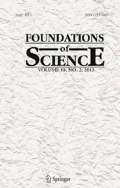Abstract
One of the most pressing issues in understanding abduction is whether it is an instinct or an inference. For many commentators find it paradoxical that new ideas are products of an instinct and products of an inference at the same time. Fortunately, Lorenzo Magnani’s recent discussion of animal abduction sheds light on both instinctual and inferential character of Peircean abduction. But, exactly for what reasons are Peirce and Magnani so convinced that animal abduction can provide us with a novel perspective? Inspired by Peirce’s and Magnani’s discussions of animal abduction, I propose to compare Peirce’s and Magnani’s views of animal abduction with the estimative power of non-human animals and humans, which was one of the internal senses in medieval psychology.
Similar content being viewed by others
References
Anderson D. R. (1986) The evolution of Peirce’s concept of abduction. Transactions of the Charles S. Peirce Society 22(2): 145–164
Anderson D. R. (1987) Creativity and the philosophy of C. S. Peirce. Martinus Nijhoff Publishers, Dordrecht
Avicenna (1952). Kitãb Al-Najt. In F. Rahman Avicenna’s Psychology (An English Translation of Kitãb Al-Najt, Book II, Chapter VI with Historico-Philosophical Notes and Textual Improvements on the Cairo Edition.). London: Oxford University Press.
Barad J. (1995) Aquinas on the nature and treatment of animals. International Scholars Publications, San Francisco/London
Black D. (1993) Estimation (Wahm) in Avicenna: The Logical and psychological dimensions. Dialogue 32: 219–258
Black D. (2000) Imagination and estimation: Arabic paradigms and western transformations. Topoi 19: 59–75
Brogaard B. (1999) Peirce on abduction and rational control. Transactions of the Charles S. Peirce Society 35(1): 129–155
Burks A. W. (1946) Peirce’s Theory of abduction. Philosophy of Science 13: 301–306
Burton R. B. (2000) The problem of control in abduction. Transactions of the Charles S. Peirce Society 36(1): 149–156
Cadwallader T. C. (1975) Peirce as an experimental psychologist. Transactions of the Charles S. Peirce Society 11: 167–186
Capek M. (1954) James’s early criticism of the automaton theory. Journal of the History of Ideas 15: 260–279
Colapietro V. (2003) The space of signs: C.S. Peirce’s critique of psychologism. In: Jacquette D. (eds) Philosophy, psychology, and psychologism. Kluwer, Boston
Diamond S. (1974) Four hundred years of instinct controversy. Behavior Genetics 4: 237–252
Fann K. T. (1970) Peirce’s theory of abduction. Martinus Nijhoff, The Hague
Feibleman J. (1946) An introduction to Peirce’s philosophy, interpreted as a system. Harper & brothers, New York, London
Frankfurt H. G. (1958) Peirce’s account of inquiry. The Journal of Philosophy 55: 588–592
Girel M. (2003) The metaphysics and logic of psychology: Peirce’s reading of James’s principles. Transactions of the Charles S. Peirce Society 39: 163–203
Hoffman M. H. G. (1999) Problems with Peirce’s concept of abduction. Foundations of Science 4(3): 271–305
James W. (1879) Are we automata?. Mind 13: 1–22
Klubertanz G. P. (1952) The discursive power: Sources and doctrine of the vis cogitativa according to St. Thomas Aquinas. The Modern Schoolman, St. Louis, Missouri
Lisska A. J. (2009) A look at inner sense in aquinas: A long-neglected faculty psychology. Proceedings of the American Catholic Philosophical Association 80: 1–19
Lisska A. J. (2010) Deely, aquinas, and poinsot: How the intentionality of inner sense transcends the limits of empiricism. Semiotica 178(1/4): 135–167
Magnani L. (2009) Abductive cognition. Springer, Berlin
Magnani, L., Li, P. (eds) (2007) Model-based reasoning in science, technology and medicine. Springer, Berlin
McCarthy, E. (1976). Medieval light theory and optics and Duns Scotus’ treatment of light in D. 13 of book II of his commentary on the sentences. Ph.D. dissertation, City University of New York.
Paavola S. (2005) Peircean abduction: Instinct or inference?. Semiotica 153(1/4): 131–154
Park, W. (2011) On animal cognition: Before and after the beast-machine controversy (forthcoming).
Peirce, C. S. (1931–1958). In C. Hartshorne, P. Weiss (vols. I–VI) & A. W. Burks (vols. VII–VIII) (Eds.), Collected Papers, (vol. 8). Cambridge, MA: Harvard University Press.
Rescher N. (1978) Peirce’s philosophy of science. University of Notre Dame Press, Notre Dame
Rosenfield, L. C. (1940, 1968). From beast-machine to man-machine. New and Enlarged Edition, New York: Octagon Books, Inc.
Roth R. J. (1988) Anderson on Peirce’s concept of abduction: Further reflections. Transactions of the Charles S. Peirce Society 24(1): 131–139
Sepper D. (1989) Descartes and the eclipse of imagination, 1618–1630. Journal of the History of Philosophy 27: 379–403
Shanahan T. (1986) The first moment of scientific inquiry: C. S. Peirce on the logic of abduction. Transactions of Charles S. Peirce Society 22(4): 450–466
Sterrett S. G. (2002) Too many instincts: Contrasting philosophical views on intelligence in humans and non-humans. Journal of Experimental and Theoretical Artificial Intelligence 14: 39–60
Thagard P. (2007) Abductive inference: From philosophical analysis to neural mechanisms. In: Feeney A., Heit E. (eds) Inductive reasoning: Experimental, developmental, and computational approaches. Cambridge University Press, Cambridge, pp 226–247
Thagard, P. (2010). How brains make mental models. In L. Magnani et al. (Eds.), Model-based reasoning in science and technology, studies in computational intelligence (vol. 314, pp. 447–461). Berlin: Springer
Wolfson H. A. (1935) The internal senses in Latin, Arabic, and Hebrew philosophic texts. Harvard Theological Review 28(2): 69–133
Yaldir H. (2009) Ibn Sînâ (Avicenna) and René Descartes on the faculty of imagination. British Journal for the History of Philosophy 17(2): 247–278
Author information
Authors and Affiliations
Corresponding author
Rights and permissions
About this article
Cite this article
Park, W. Abduction and Estimation in Animals. Found Sci 17, 321–337 (2012). https://doi.org/10.1007/s10699-011-9275-2
Published:
Issue Date:
DOI: https://doi.org/10.1007/s10699-011-9275-2




